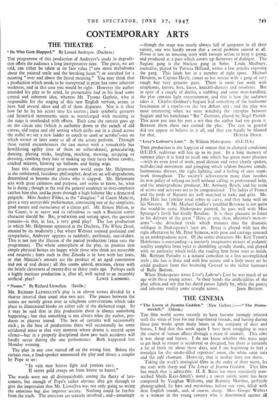"Love's Labour's Lost." By William Shakespeare. (0.U.D.S.)
THIS production is the happiest of omens that in changed conditions O.U.D.S. redivivus will live up to its past. In a long memory of summer plays it is hard to recall one which has given more pleasure —with its even level of work, good diction and verse clearly spoken, well-devised movement and grouping which seldom become untidy, harmonious dresses, the right lighting and a feeling of sure team- work throughout. The society's achievement more than justifies its new policy of relying on itself without calling in professional help, and the undergraduate producer, Mr. Anthony Besch, and his team of actors and actresses are to be congratulated. The ladies of France and the lords of Navarre are well matched in looks and gifts. Mr. John Hale has familiar royal robes to carry, and they hang well on his Navarre. If Mr. Michael Godley's youthful Berowne is not quite the would-be cynic Shakespeare painted, he goes well with Miss Spranger's lively but kindly Rosaline. It is sheer pleasure to listen to his delivery of the great "Have at you, then, affection's men-at- arms "—the detached tirade which matures into the dramatic soliliquy in Shakespeare's later art. Boyet is played with just the right affectation by Mr. Peter Symcox, with pose and carriage unusual in an undergraduate actor. Of the comic characters Mr. Ken Tynan's Holofernes is outstanding—a masterly imaginative picture of pedantic senility complete from voice to shambling spindle shanks, and played with an authority which holds the reading firm from start to finish. Mr. Bertram Parnaby is a natural comedian in a less accomplished style ; the fun is there and with less nature and a little more art he could graduate from this bouncing Costard to the richer humours of Bully Bottom.
When Shakespeare wrote Love's Labour's Lost he was much of an age with these young actors. Tn their hands the artificialities of the play soften and wit that has dated passes lightly by, while the poetry and inherent vitality come straight across. JOHN BRYSON.


































 Previous page
Previous page